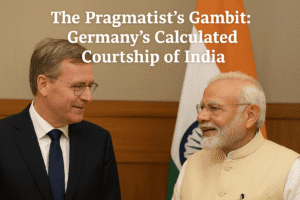The Pragmatist’s Gambit: Germany’s Calculated Courtship of India
The Pragmatist’s Gambit: Germany’s Calculated Courtship of India
In the high-stakes game of global diplomacy, principles and pragmatism often sit at opposite ends of the table. Germany’s new Foreign Minister, Johann Wadephul, seems to have chosen his seat. His recent two-day visit to India, with a delegation of top German executives in tow, was less a meeting of ideological soulmates and more a strategic calculation in a world order shaken by tariffs and tanks.
Wadephul stepped off the plane in Bangalore lavishing praise, calling India a “privileged partner” with a “similar” view on democracy and a rules-based world. Yet, the backdrop to this flattery was starkly contradictory. Just a day prior, his host, Prime Minister Narendra Modi, was in Shanghai, warmly engaging with Russian President Vladimir Putin—the architect of the most blatant violation of those very rules in modern Europe.
This isn’t a case of diplomatic blindness; it’s a reflection of a new, uncomfortable realism dawning in Berlin.
The Trump Tariffs: A Catalyst for Change
The urgent subtext to Wadephul’s visit is the economic earthquake triggered by U.S. President Donald Trump’s tariff frenzy. As the world’s leading exporter, Germany feels the tremors more acutely than most. The sudden need to diversify away from over-reliance on volatile transatlantic trade has catapulted India to the top of the agenda.
The goal is clear: seal the long-stalled EU-India trade deal “as fast as possible.” Wadephul’s delegation—a who’s who of German industry from aerospace to insurance—wasn’t just for show. It was a tangible signal that Europe’s economic powerhouse is serious about putting its money where its mouth is. The message to New Delhi is one of opportunity: as doors close in the West, others are eager to open in Europe.
The Delicate Dance Over Ukraine
The elephant in the negotiating room remains India’s steadfast neutrality on Ukraine and its role as a top consumer of Russian oil. Germany is caught in a bind. Publicly, it must condemn the funding of Putin’s war machine. Privately, it recognizes that hectoring a sovereign nation like India is a counterproductive strategy.
The German approach, therefore, is one of subtle redirection rather than public confrontation. The impending billion-euro deal for six German-made submarines, with executives from thyssenkrupp Marine Systems present on the trip, is a perfect example. It offers India a path to modernize its military while simultaneously weaning itself off Russian hardware—a strategic win-win executed through commerce, not condemnation.
Trump’s recent imposition of 50% tariffs on Indian goods, explicitly citing its Russian oil imports, ironically does some of Germany’s tough talking for it. The move, which could significantly dent India’s GDP, makes Europe a more attractive and stable partner by comparison. Modi’s embrace of Putin can thus be seen not just as friendship, but as a defiant signal of India’s independent foreign policy in a multipolar world.
Beyond geopolitics: A Mutually Beneficial Partnership
The relationship isn’t solely built on navigating geopolitical fault lines. There is a powerful, organic synergy at work.
For Germany, India represents a massive, skilled talent pool desperately needed to fill chronic labour shortages, particularly in its vital IT and engineering sectors. For India, access to German technology, industrial expertise, and capital is fuel for its own economic ambitions, especially in growing its manufacturing base.
Wadephul’s tour of innovation hubs run by Mercedes-Benz and SAP in Bangalore—India’s tech capital—was a powerful visual of this synergy in action. It’s a partnership where German engineering meets Indian digital prowess.
The Bottom Line
Johann Wadephul’s visit underscores a shift in German foreign policy towards a more pragmatic, interest-driven approach. It recognizes that in a fragmented world, partners may not be perfect allies, but they are indispensable. The minister’s mission was not to scold India for its friendships but to compellingly present an alternative: a deeper, more prosperous integration with Europe.
The bet is that economic opportunity and strategic necessity will eventually outweigh old loyalties. It’s a high-risk diplomatic yoga pose, balancing principle with profit. For both Germany and India, the potential rewards are too great to not try.

You must be logged in to post a comment.